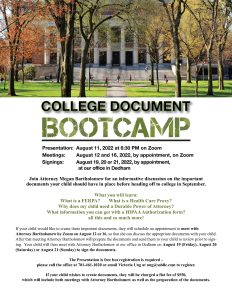With Father’s Day just a few days away, now is the perfect time to initiate a meaningful conversation with your parents about estate planning, blending the celebration of your parents’ legacy with the practical steps needed to preserve it. Despite its importance, only 33% of people in the United States have executed some form of legal estate plan. The sensitive nature of the topic causes many people to kick the can down the road, intending to deal with it later, which is a problem when “later” becomes “too late.” Are your parents included in the overwhelming majority of people who have pushed off this essential legal planning?
Contrary to popular belief, estate planning is not just about distributing assets after a person’s death. Some documents, like a Health Care Proxy and Durable Power of Attorney, actually work during the person’s lifetime so that loved ones have the authority to take care of the person while he or she is living but incapacitated. With aging parents, these documents are just as important as post-death documents like Wills and Trusts. More significantly, estate planning is about ensuring that your parents’ wishes are respected and that their legacies are preserved in a way that reflects their values and intentions.
Initiating this important conversation with your parents may be daunting, so follow these steps to make the discussion a little easier:
Start the discussion by framing it within the context of Father’s Day, emphasizing your desire to honor your parents’ legacy and ensure that their contributions are remembered and cherished. If you feel comfortable, you can briefly discuss key documents such as Wills, which outline the distribution of assets, and Trusts, which can reduce estate taxes and avoid the probate process. You should also highlight the importance of incapacity documents like a Health Care Proxy, HIPAA Authorization, and Durable Power of Attorney. These documents will make it easier on your family if your parents’ capacity is diminished to the point that they cannot make their own medical or financial decisions. Incapacity documents are a safeguard against a long, expensive court process to obtain a guardianship and/or conservatorship that can occur when your parents do not plan ahead.
It’s important to remember that you won’t have all the answers – and you’re not supposed to. That’s our job. Encourage your parents to set up a meeting with an estate planning attorney who can discuss their needs in more detail, give them information about the documents appropriate to their situation, and answer any questions they may have. Father’s Day can be the first of many conversations that ensure your parents’ estate planning remains current and effective. By simply starting the conversation, you’re taking the first step in giving your parents the gift of peace of mind, knowing that their legacy will be honored and their wishes respected, all while strengthening your family’s future security.
Attorney Leah A. Kofos is an associate attorney with the Dedham firm of Samuel, Sayward & Baler LLC, which focuses on advising its clients in the areas of trust and estate planning, estate settlement, and elder law matters. This article is not intended to provide legal advice or create or imply an attorney-client relationship. No information contained herein is a substitute for a personal consultation with an attorney. For more information visit ssbllc.com or call 781-461-1020.
© 2024 Samuel, Sayward & Baler LLC

 In light of the COVID-19 pandemic, many people have questions about what will happen if they get sick or pass away. As estate planners, these are questions we think about and answer every day. Our goal as estate planning attorneys is for everyone to have an updated estate plan that will ensure you and your family are taken care of in the event of illness or death. However, there are many folks for whom estate planning has not made it to the top of their To Do list. Here are five answers to many of the questions we are hearing (over the phone and online), and some steps you can take in the short run to give yourself some peace of mind.
In light of the COVID-19 pandemic, many people have questions about what will happen if they get sick or pass away. As estate planners, these are questions we think about and answer every day. Our goal as estate planning attorneys is for everyone to have an updated estate plan that will ensure you and your family are taken care of in the event of illness or death. However, there are many folks for whom estate planning has not made it to the top of their To Do list. Here are five answers to many of the questions we are hearing (over the phone and online), and some steps you can take in the short run to give yourself some peace of mind. Potential clients sometimes call
Potential clients sometimes call  It is everyone’s hope that they will die after they have managed to get everything in order so that their family will have an easy time of it and not be left picking up the pieces. Here are some things to put on your Estate Planning To Do list, to make it easier on your family if you depart this world before tying up all the loose ends:
It is everyone’s hope that they will die after they have managed to get everything in order so that their family will have an easy time of it and not be left picking up the pieces. Here are some things to put on your Estate Planning To Do list, to make it easier on your family if you depart this world before tying up all the loose ends:

 In this season of giving, I thought it would be a good idea to chat about one of the best gifts you can give your family. It is not a fancy vacation or a 60-inch TV – it is the gift of an estate plan – yours. When you create an
In this season of giving, I thought it would be a good idea to chat about one of the best gifts you can give your family. It is not a fancy vacation or a 60-inch TV – it is the gift of an estate plan – yours. When you create an